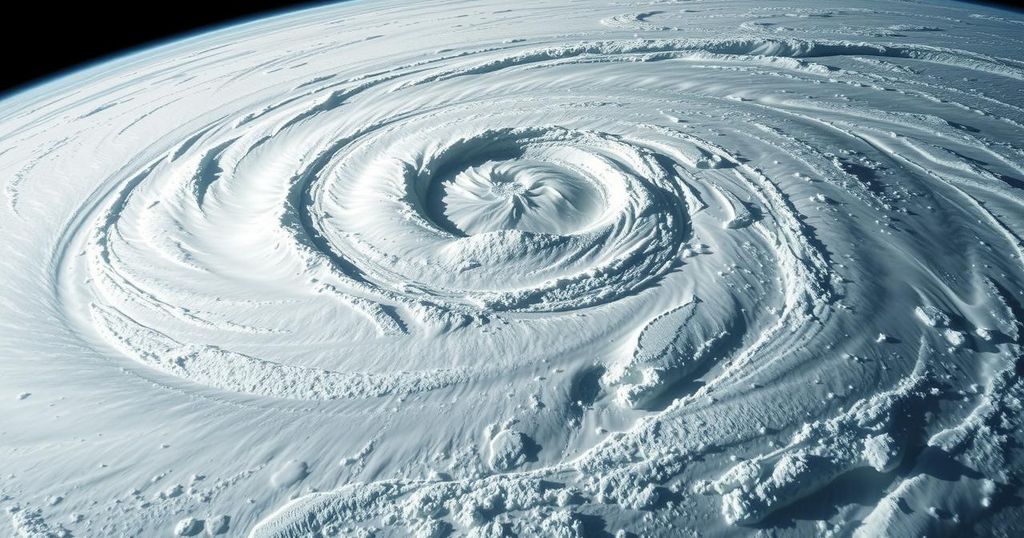World news
AFRICA, AGALEGA, BRUNO RETAILLEAU, CHI, CLIMATE, CRISIS UNIT, EMMANUEL MACRON, EUROPE, EVACUATIONS, FRANCE, INTERIOR, INTERMINISTER, JOINT TYPHOON WARNING CENTER, MAURITIAN, MAYOTTE, NASA, NASA EARTH OBSERVATORY, NATURAL DISASTER, NATURAL DISASTERS, NO, POWER OUTAGES, TORTOISE MEDIA, TYPHOON WARNING CENTER
Oliver Grayson
0 Comments
NASA Captures Cyclone Chido’s Devastation in Mayotte
On December 14, 2024, Cyclone Chido devastated Mayotte, leading to significant destruction and loss of life, with at least 21 confirmed fatalities. The cyclone, classified as a Category 4 hurricane, caused unprecedented damage in the region, prompting urgent emergency responses from French authorities. Following Mayotte, the storm impacted Mozambique, affecting thousands more and resulting in additional loss of life.
On December 14, 2024, Cyclone Chido wreaked havoc on the islands of Mayotte, leaving behind significant destruction and loss of life. Captured through powerful satellite imagery from NASA, the cyclone displayed fierce hurricane-force winds that devastated this French overseas territory in the Indian Ocean. While initial reports indicate at least 21 fatalities, the total number of victims could reach into the hundreds or thousands, highlighting the catastrophe’s severity as reported by Tortoise Media.
Cyclone Chido emerged as a tropical disturbance on December 5, rapidly intensifying to peak winds of 155 miles per hour, categorizing it as a strong Category 4 hurricane. After impacting the Agaléga Islands, Chido barreled towards Madagascar before making landfall on Mayotte. Satellite images released by NASA depict the island engulfed in the cyclone’s fury shortly after landfall, revealing the storm’s immediate and destructive impact.
French officials characterized the destruction as unprecedented. Minister of the Interior Bruno Retailleau remarked on the colossal challenges ahead for France in Mayotte, underscoring the government’s commitment to aiding victims. President Emmanuel Macron confirmed urgent emergency measures and announced plans to visit Mayotte to support recovery efforts, acknowledging the gravity of this tragic event and preparing for a national mourning.
Météo-France declared Cyclone Chido as the most powerful storm to strike Mayotte in over 90 years, with preliminary assessments from the European Union indicating extensive structural damage across the region. The cyclone obliterated entire neighborhoods, severely impacted critical infrastructure—including the capital city, Mamoudzou, and the local airport—while leaving tens of thousands without power. Recovery in Mayotte is further complicated by its status as France’s poorest territory, lacking the requisite resources to manage such a disaster.
Following its onslaught in Mayotte, Cyclone Chido continued westward, landfalling in Mozambique on December 15, again with Category 4 strength. The storm has affected 174,000 individuals in Mozambique, resulting in at least 34 fatalities and the destruction of approximately 35,000 homes. Chido is anticipated to weaken over Zimbabwe shortly after its impact.
Scientific scrutiny of such cyclones is vital as climate patterns evolve, necessitating preparedness for extreme weather events. For additional inquiries or tips on related science stories, contact Newsweek at [email protected].
The article discusses Cyclone Chido, a significant natural disaster that struck Mayotte in December 2024. Cyclones, particularly in tropical regions, can cause severe destruction due to their high winds and rainfall, capable of overwhelming infrastructure and causing loss of life. This event is marked by the unprecedented strength of Cyclone Chido, highlighting both immediate impacts on the island of Mayotte and further implications for neighboring regions like Mozambique; it showcases the vulnerability of lesser-developed territories to such disasters and the challenges they face in recovery efforts.
In summary, Cyclone Chido has showcased its devastating effects on Mayotte, revealing the dire circumstances faced by this territory and the profound loss of life it has caused. The cyclone’s consequences extend beyond Mayotte, impacting Mozambique as well, which underscores the regional nature of such weather phenomena. The responses from French officials highlight governmental efforts to address the immediate needs resulting from this catastrophe, even as the humanitarian and infrastructural challenges ahead remain considerable.
Original Source: www.newsweek.com




Post Comment